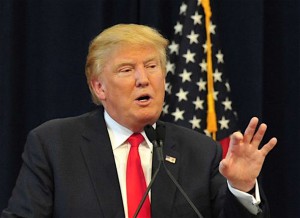
A newly formed coalition of automotive companies, Driving American Jobs, is attempting to convince President Donald Trump to leave NAFTA as it is.
While President Donald Trump tries to line up support for tax reform among a restless U.S. Senate, a confrontation looms with a large swath of the business community, starting with the auto industry, about his efforts to reform the North American Free Trade Agreement.
“Cross-border trade supports over 46,000 U.S. trucking jobs, including 31,000 U.S. truck drivers, and generates $6.5 billion in revenue for our industry annually,” noted Bob Costello, chief economist for the American Trucking Association.. “As the U.S. renegotiates this agreement with Canada and Mexico, we urge them to keep the tremendous benefits to our economy and our industry in mind,” he said.
Costello’s remarks echo the positions of other industries from agriculture to railroads and autos, which has been campaigning, publicly and privately, against the an overhaul of NAFTA. The auto industry has argued since the Trump administration took office back in January that sweeping changes to NAFTA or abandoning it altogether would jeopardize an integrated supply chain that has developed during the past quarter century.
The integrated supply base has helped make car makers producing vehicles in North America competitive with manufacturers operating in Europe and Asia.
Major automakers, suppliers and auto dealers organized a new coalition this week, Driving American Jobs, to lobby against any move to abandon NAFTA.

A new coalition of auto companies, Driving American Jobs, has formed to try to sway the Trump administration.
The coalition includes trade association representing General Motors Co., Toyota Motor Corp., Volkswagen AG, Hyundai Motor Co, Ford Motor Co and several suppliers. The group is supporting an advertising campaign to convince the White House and voters that the agreement has boosted the U.S. automotive production and jobs.
(NAFTA talks bog down as sides take a recess. For the story, Click Here.)
The U.S. economy has gone through a rebirth, and the auto industry has led the way, creating hundreds of thousands of jobs, exporting millions of cars and trucks and proving, yet again, that American workers can compete and win in the global marketplace.
“The North American Free Trade Agreement has played a key role in our manufacturing renaissance. Last year we produced 1 million more U.S. cars and trucks than we did before NAFTA,” the group noted on its website.
“We’ve become more globally competitive through NAFTA and companies from around the world have put down roots here, building factories, providing jobs and investing in our communities. This year alone more, automakers and suppliers have announced more than $9.5 billion in new U.S. investment. Now Washington is pushing for changes to the agreement,” the Driving American Jobs.”
Earlier this year, business groups led a successful campaign to scuttle the so-called border tax, which would have put tariffs on finished goods imported into the U.S.
(Click Here for details about Trump’s warning against NAFTA talks.)
If anything, the lobbying effort aimed at keeping NAFTA intact is even broader and includes the owners of family farms, whose numbers have steadily dwindled over the past three decades. By one account family farms could be a dealt a death blow by withdrawl from NAFTA since foreign trade is a major source of farm income.
Labor unions, which have long criticized NAFTA, have generally supported Trump’s push to renegotiate the agreement. But labor unions such as the United Auto Workers, Teamsters and United Steel Workers as well as Unifor, the largest private sector union in Canada, are also deamnding changes to NAFTA’s labor provisions that are not exactly part of the Trump agenda.
Unifor has even demanded an end to “Right To Work” laws used in many states in the U.S. as part of the a part of revamped agreement. The Center for Automotive Research in Ann Arbor, Michigan, noted that so far the efforts to revise NAFTA have gone nowhere.
“While the Canadian and Mexicannegotiating teams have many points of disagreement with the Trump administration’s NAFTA bargaining positions, the U.S. proposal to include a ‘sunset clause’ in the new agreement has drawn perhaps the sharpest rebukes from the trading partners, as well as from U.S. business groups including the U.S. Chamber of Commerce,” CAR noted in a recent commentary on the talks.
(Trump negotiators’ new autos proposal may kill NAFTA talks. To see the story, Click Here.)
“The Administration has proposed a provision that would force a NAFTA renegotiation every five years — a move that would inject additional risk into any long-term manufacturing investment, production footprint and supply chain sourcing decisions,” CAR added.
